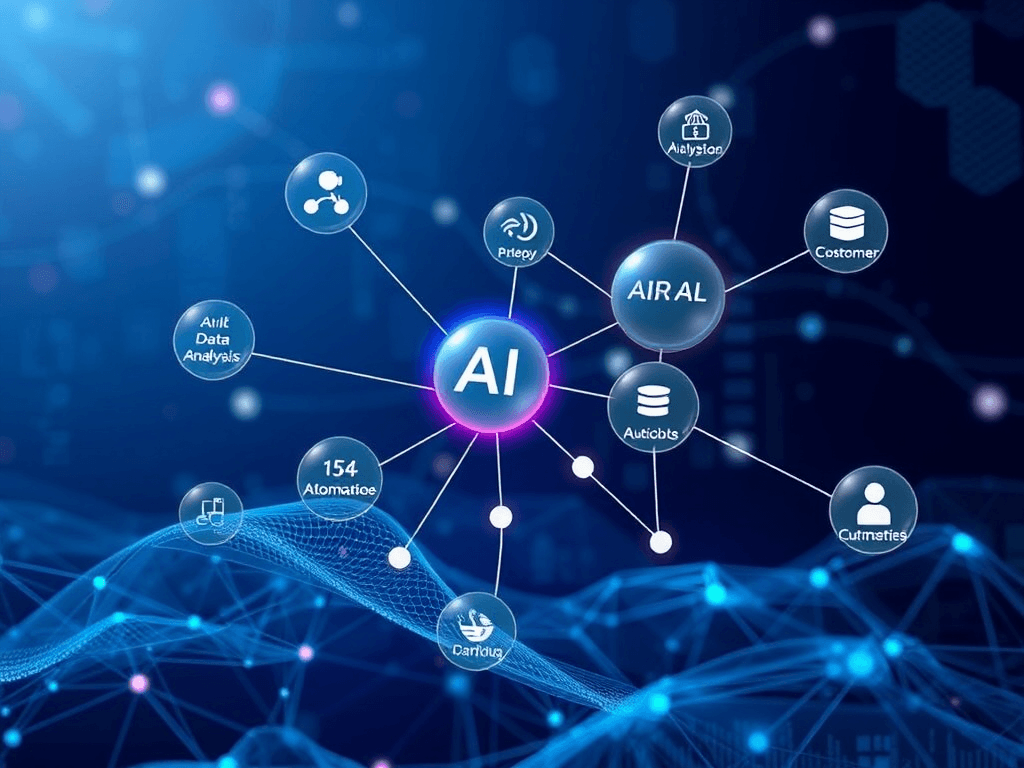What are the Different AI Platforms?
By RG team · 12 min read
Last Updated on May 28, 2023
Wait a minute...

What are the Different AI Platforms?

Photo by Max Langelott on Unsplash
Artificial intelligence (AI) has become a buzzword in the business world. Many organizations have embraced AI to help them make informed decisions, reduce costs, and improve customer experiences. But, what are the different AI platforms available in the market?
Entrepreneurs and business professionals interested in incorporating AI solutions need to understand the different platforms available to make informed decisions. With a plethora of platforms available, it can be challenging to know which one is best suited for a particular business. In this blog post, we will dive into the topic and provide an analytical breakdown of the different AI platforms available in the market today, their functionalities and limitations, and which one best suits your business needs.
Whether you are starting your AI journey or considering a platform shift, this article will provide you with the necessary knowledge to make a well-informed decision. So, let's dive in!
Understanding AI Platforms
Before diving into the different AI platforms available, it's essential to first understand what AI platforms are and their functionalities. AI platforms are software frameworks designed to help individuals and businesses develop, train, and deploy AI models. These platforms offer various tools, algorithms, and libraries that developers and data scientists can use to build smart applications.
The primary function of AI platforms is to help businesses identify patterns, automate mundane tasks, and analyze large datasets. The platforms come with prebuilt models that businesses can use or develop custom AI models designed explicitly for their specific needs. Additionally, AI platforms aid businesses to save time and resources by automating repetitive tasks and generating insights that can be used to enhance customer experiences, deliver targeted marketing campaigns, and streamline business operations.
In summary, AI platforms are vital components of the AI ecosystem. Their functionalities make it possible for businesses to incorporate AI solutions that suit their unique operations and customer needs. In the next section, we explore the top 18 AI platforms in 2022.
Top 18 Artificial Intelligence Platforms in 2022
In this section, we'll explore the most widely used AI platforms in the market. Here are the top 18 AI platforms that can help businesses bridge the gap in data analysis, automation, and insights:
1. Google AI Platform
Google's AI platform provides a secure, managed, and scalable infrastructure to train and deploy machine learning models. The platform comes with pre-built templates and tools that ease the process of building, training and deploying custom models on the cloud.
2. TensorFlow
TensorFlow is an open-source machine learning framework developed by Google. The platform allows developers to build and train deep learning models for various applications such as image and speech recognition, language translation and fraud detection.
3. Microsoft Azure
Azure is a cloud computing platform provided by Microsoft that offers a range of AI services, including cognitive services, machine learning, and bot services. Additionally, the platform allows businesses to build and deploy complex AI models on the cloud.
4. Rainbird
Rainbird is a platform that simplifies complex decision-making processes. It leverages advanced machine learning algorithms and natural language processing to enhance decision-making in businesses.
5. Infosys Nia
Infosys Nia is an AI-powered enterprise platform developed by Infosys that helps businesses automate and optimize their processes. Additionally, the platform provides businesses with advanced analytics and forecasting capabilities.
6. Wipro HOLMES
HOLMES is a cognitive computing platform developed by Wipro that streamlines IT and business operations. It automates various business processes to save time and resources, converting raw data into actionable insights.
7. Dialogflow
Dialogflow is a natural language understanding platform developed by Google that allows businesses to build conversational interfaces for their products and services. The platform can be used to develop custom chatbots that can interact with customers via a web or mobile chat interface.
8. H2O
H2O is an open-source machine learning and AI platform that allows developers to build and train complex models. The platform uses advanced algorithms and data analysis tools to generate accurate insights from large datasets.
9. PyTorch
PyTorch is an open-source machine learning framework developed by Facebook that enables developers to build and train deep learning models. The platform allows for fast, easy-to-use prototyping, making it ideal for rapid application development.
10. Amazon SageMaker
SageMaker is a fully managed machine learning service provided by Amazon that allows businesses to build, train, and deploy machine learning models at scale. The platform leverages advanced machine learning algorithms and pre-built models to generate insights that help businesses refine their operations.
11. IBM Watson Studio
Watson Studio is an AI-powered data science and machine learning platform developed by IBM. The platform provides businesses with advanced data analysis capabilities, predictive modeling, and a range of development tools to build custom AI models.
12. Google Cloud AI Platform
Google Cloud AI Platform is a cloud-based platform that provides AI and machine learning services to businesses. The platform can be used to develop and deploy advanced machine learning algorithms on the cloud.
13. CNTK
CNTK is an open-source deep learning framework developed by Microsoft that allows developers to build and train deep learning models. The platform offers pre-built models and templates that make it easy for businesses to deploy advanced machine learning algorithms.
14. Dataiku
Dataiku is an AI-powered platform that helps businesses build and deploy machine learning models at scale. The platform comes with advanced analytics and data visualization tools that make it easy for businesses to generate insights from big data.
15. DataRobot
DataRobot is an automated machine learning platform that allows businesses to build and deploy AI models without requiring extensive AI expertise. The platform leverages advanced machine learning algorithms to generate insights that can be used to improve business operations.
16. Neural Designer
Neural Designer is a machine learning software designed for businesses of any size that uses data mining and AI to solve complex business problems. The platform offers advanced analytics, forecasting, and data visualization tools that make it easy for businesses to generate insights from data.
17. TensorRT
TensorRT is an inference engine developed by NVIDIA that optimizes deep learning models for production deployment. The platform allows businesses to bring deep learning models to the edge, running them on lower-powered devices.
18. Keras
Keras is an open-source deep learning framework that allows developers to build and train deep learning models easily. The platform offers advanced modeling capabilities and pre-built models that make it easy for businesses to deploy advanced machine learning algorithms.
In summary, when deciding on an AI platform, it's essential to consider the specific needs of your business, the platform functionalities, and limitations. The most widely used AI platforms have unique capabilities that businesses can leverage to automate processes, generate insights, and provide a better customer experience. In the next section, we will explore the top 10 AI software platforms for 2023.
Top 10 AI Software Platforms for 2023
The world of AI is rapidly evolving, and businesses need to stay updated with the latest trends to remain competitive. In this section, we'll explore the top 10 AI software platforms that businesses should keep an eye on in 2023.
1. IBM Watson
IBM Watson is an AI-powered software platform that allows businesses to build and deploy AI models. The platform is equipped with advanced analytics tools, natural language processing, and machine learning capabilities that allow businesses to generate insights, automate workflows, and improve decision-making.
2. HPE Haven OnDemand
HPE Haven OnDemand is a cloud-based AI platform that provides businesses with advanced data analysis tools, predictive modeling capabilities, and machine learning algorithms. The platform leverages advanced analytics and natural language processing to generate insights from big data, helping businesses make informed decisions.
3. Salesforce Einstein
Salesforce Einstein is an AI-powered platform that offers businesses predictive analytics, machine learning, and natural language processing capabilities. The platform can be used to automate workflows, generate insights, and personalize customer experiences.
4. Google Cloud Platform
Google Cloud Platform is a cloud-based platform that offers businesses a range of AI and machine learning services. The platform provides businesses with the tools and capabilities necessary to build and deploy scalable custom models that drive business outcomes.
5. Microsoft Azure
Microsoft Azure provides businesses with an array of AI and machine learning services, including computer vision, text analysis, and speech recognition. The platform offers businesses advanced data analysis tools, machine learning models, and custom algorithms, making it possible to build scalable AI solutions.
6. Amazon Web Services
Amazon Web Services provides businesses with a range of AI and machine learning services, including speech recognition, natural language processing, and predictive analytics. The platform empowers businesses to build custom AI models, automate workflows, and generate insights that improve decision-making.
7. KAI
KAI is an AI-powered conversational platform that enables businesses to provide customers with 24/7 customer support. The platform offers businesses a range of advanced chatbot capabilities, including natural language processing, sentiment analysis, and predictive analytics.
8. Cognitivescale
Cognitivescale is a cloud-based AI platform that offers businesses advanced analytics, predictive modeling, and machine learning capabilities. The platform leverages data to generate insights that help businesses automate workflows, enhance customer experiences, and drive business growth.
9. Nutonomy
Nutonomy is an AI-powered software platform that enables businesses to build and deploy autonomous vehicles. The platform provides businesses with advanced machine learning algorithms, computer vision, and sensor fusion capabilities that enable safe, efficient, and scalable autonomous transportation.
10. Open AI
Open AI is an AI research lab that focuses on creating safe and ethical AI systems. The platform provides businesses with a range of advanced AI and machine learning models, including language models and image recognition models.
In conclusion, businesses that want to stay ahead of the curve in AI need to start exploring cutting-edge AI software platforms. The platforms mentioned above offer a broad range of tools and capabilities that businesses can leverage to automate workflows, generate insights, and improve overall business performance. However, businesses need to consider their unique needs and objectives when selecting an AI software platform.
Popular AI Platforms
Apart from the top-ranking AI software platforms mentioned above, there are other popular platforms that businesses can leverage to automate workflows, enhance decision-making and provide superior customer experiences. In this section, we will explore some popular AI platforms to give businesses a better understanding of the diverse AI landscape.
1. Alteryx
Alteryx is a self-service data analytics platform that enables businesses to generate insights from big data without the need for extensive AI expertise. The platform offers businesses advanced data blending, predictive modeling, and machine learning capabilities.
2. DataRobot
DataRobot is an automated machine learning platform that allows businesses to build and deploy AI models without requiring extensive AI expertise. The platform offers businesses advanced machine learning algorithms and predictive modeling capabilities that assist in decision-making and workflow automation.
3. RapidMiner
RapidMiner is a platform that enables businesses to build and deploy custom AI models without requiring extensive AI expertise. The platform provides businesses with a range of analytics tools, machine learning algorithms, and predictive modeling capabilities.
4. Kofax
Kofax is an AI-powered platform that automates manual tasks and streamlines workflows. The platform leverages advanced computer vision and machine learning algorithms to automate repetitive tasks, free up employee time, and improve overall business performance.
5. SAS
SAS is a platform that provides businesses with advanced analytics tools, predictive modeling capabilities, and machine learning algorithms. The platform enables businesses to generate insights from big data, enhance decision-making, and streamline workflows.
6. TensorFlow
TensorFlow is an open-source machine learning framework developed by Google. The platform allows developers to build and train deep learning models for various applications such as image and speech recognition, language translation, and fraud detection.
7. AWS SageMaker
AWS SageMaker is a platform that enables businesses to build and deploy machine learning models at scale. The platform features advanced analytics tools, machine learning algorithms, and natural language processing capabilities that help businesses generate insights and enhance decision-making.
8. IBM Watson Studio
IBM Watson Studio is an AI-powered data science and machine learning platform developed by IBM. The platform provides businesses with advanced data analysis capabilities, predictive modeling, and a range of development tools to build custom AI models.
9. Microsoft Azure
Microsoft Azure provides businesses with a range of AI and machine learning services, including computer vision, text analysis, and speech recognition. The platform offers businesses advanced data analysis tools, machine learning models, and custom algorithms, making it possible to build scalable AI solutions.
10. Google AI Platform
Google's AI platform provides a scalable infrastructure to train and deploy custom machine learning models. The platform comes with pre-built templates and tools that ease the process of building, training, and deploying custom models on the cloud.
In conclusion, businesses need to keep up with the diverse AI landscape to make well-informed decisions. AI platforms are essential components in the AI ecosystem as they provide the necessary tools, algorithms, and libraries to build intelligent applications. The platforms mentioned above are potential solutions that businesses can leverage to automate processes, generate insights, and enhance customer experiences. However, businesses need to evaluate their unique needs and objectives when selecting an AI platform.
Conclusion
Artificial intelligence has become an essential component of the business world. AI platforms provide businesses with advanced tools, algorithms, and libraries necessary to build intelligent applications that streamline workflows, automate processes, and enhance decision-making.
In this blog post, we have analyzed the different AI platforms available in the market, their functionalities, limitations, and potential use cases. As a business, you need to consider your unique needs, objectives, and budget when selecting an AI platform that suits you best.
The top 18 AI platforms and the top 10 AI software platforms to keep an eye on in 2023 are potential solutions that businesses can leverage to automate their operations and enhance customer experiences. Nonetheless, there are other popular AI platforms that businesses need to explore to compare and make well-informed decisions.
To sum up, the right AI platform can make a significant impact on your business operations, customer experiences, and bottom line. Thus, businesses should integrate AI solutions to remain competitive in the ever-evolving digital landscape.



